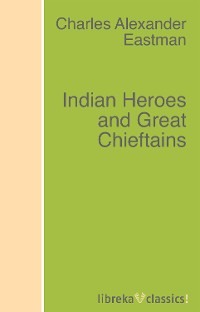
Полная версия
Old Indian Days


Titel: Old Indian Days
von Scott Hemphill, L. M. Montgomery, L. Frank Baum, John Milton, René Descartes, Baroness Emmuska Orczy Orczy, Karl Marx, Friedrich Engels, Edgar Rice Burroughs, Unknown, Norman F. Joly, Norman Coombs, David Slowinski, Mark Twain, Henry David Thoreau, Stephen Crane, John Goodwin, Nathaniel Hawthorne, Winn Schwartau, Odd De Presno, Sir Walter Scott, Jules Verne, Mary Wollstonecraft Shelley, United States. Central Intelligence Agency, United States, Canada, Willa Sibert Cather, Anthony Hope, Edwin Abbott Abbott, Charles Dickens, Frederick Douglass, William Shakespeare, Bruce Sterling, Franklin Delano Roosevelt, Jane Austen, Thomas Hardy, Sir Arthur Conan Doyle, Edna St. Vincent Millay, Gene Stratton-Porter, Richard McGowan, Frances Hodgson Burnett, United States. Bureau of the Census, Electronic Frontier Foundation, Robert Louis Stevenson, Anonymous, Jerry Bonnell, Robert Nemiroff, Andrew Lang, G. K. Chesterton, John Bunyan, Sunzi 6th cent. B.C., Harold Frederic, Mary Wollstonecraft, Victor Hugo, René Doumic, Upton Sinclair, Virginia Woolf, George Eliot, Thomas Paine, Benjamin Franklin, Plato, Samuel Taylor Coleridge, Ruth M. Sprague, William Dean Howells, Wilkie Collins, Jean Webster, H. G. Wells, Kate Chopin, Mark Eliot Laxer, Louisa May Alcott, Frank Norris, Edith Wharton, S. D. Humphrey, Henry Hunt Snelling, William Morris, Mrs. Susanna Rowson, Christopher Morley, Sax Rohmer, Oscar Wilde, Gaston Leroux, Henry James, Project Gutenberg, Harriet Beecher Stowe, Various, Robert W. Service, A. B. Paterson, Henry Lawson, Jack London, Laozi, D. H. Lawrence, Julius Caesar, Joseph Conrad, W. Somerset Maugham, George MacDonald, Marcus Tullius Cicero, Virgil, Theodore Dreiser, Giuseppe Salza, Rudyard Kipling, ca. 50 BCE-16 BCE Sextus Propertius, Robert A. Harris, William Wells Brown, graf Leo Tolstoy, Omar Khayyám, Michael Hart, Library of Congress. Copyright Office, Coalition for Networked Information, Geoffrey Chaucer, Adam Lindsay Gordon, Hiram Corson, Robert Browning, Amy Lowell, Rupert Brooke, Joyce Kilmer, John Gower, Saki, Kenneth Grahame, Anna Sewell, Martin Luther, Philipp Melanchthon, National Atomic Museum, Alexander William Kinglake, Charles John Cutcliffe Wright Hyne, Amelia Edith Huddleston Barr, James Branch Cabell, Bayard Taylor, Horatio Alger, Booth Tarkington, Hjalmar Hjorth Boyesen, Michael Husted, Émile Gaboriau, Jerome K. Jerome, Stephen Vincent Benét, Edwin Arlington Robinson, J. Frank Dobie, Joseph Rodman Drake, Eliot Gregory, John Fox, John Muir, Richard Harding Davis, Edgar A. Guest, Mary Roberts Rinehart, Thomas Nelson Page, Sir Walter Alexander Raleigh, Rebecca Harding Davis, Charles Alexander Eastman, Zitkala-Sa
ISBN 978-3-7429-0300-6
Alle Rechte vorbehalten.
Es ist ohne vorherige schriftliche Erlaubnis nicht gestattet, dieses Werk im Ganzen oder in Teilen zu vervielfältigen oder zu veröffentlichen.
OLD INDIAN DAYS
By Charles A. Eastman
(Ohiyesa)
Contents
PART ONE. THE WARRIOR I. THE LOVE OF ANTELOPE II. THE MADNESS OF BALD EAGLE III. THE SINGING SPIRIT IV. THE FAMINE V. THE CHIEF SOLDIER VI. THE WHITE MAN'S ERRAND VII. THE GRAVE OF THE DOG PART TWO. THE WOMAN I. WINONA, THE WOMAN-CHILD II. WINONA, THE CHILD-WOMAN III. SNANA'S FAWN IV. SHE-WHO-HAS-A-SOUL V. THE PEACE-MAKER VI. BLUE SKY VII. THE FAITHFULNESS OF LONG EARS VIII. THE WAR MAIDEN GLOSSARY
PART ONE. THE WARRIOR
I. THE LOVE OF ANTELOPE
I
Upon a hanging precipice atop of the Eagle Scout Butte there appeared a motionless and solitary figure—almost eagle-like he perched! The people in the camp below saw him, but none looked at him long. They turned their heads quickly away with a nervous tingling, for the height above the plains was great. Almost spirit-like among the upper clouds the young warrior sat immovable.
It was Antelope. He was fasting and seeking a sign from the "Great Mystery," for such was the first step of the young and ambitious Sioux [who wished to be a noted warrior among his people].
He is a princely youth, among the wild Sioux, who hunts for his tribe and not for himself! His voice is soft and low at the campfire of his nation, but terror-giving in the field of battle. Such was Antelope's reputation. The more he sought the "Great Mystery" in solitude, the more gentle and retiring he became, and in the same proportion his courage and manliness grew. None could say that he was not a kind son and a good hunter, for he had already passed the "two-arrow-to-kill," his buffalo examination.
On a hot midsummer morning a few weeks later, while most of the inmates of the teepees were breakfasting in the open air, the powerful voice of the herald resounded among the pine-clad heights and green valleys.
"Hear ye, hear ye, warriors!" he chanted loudly. "The council has decreed that four brave young men must scout the country to the sunsetward of the camp, for the peace and protection of our people!"
All listened eagerly for the names of the chosen warriors, and in another moment there came the sonorous call: "Antelope, Antelope! the council has selected you!"
The camp was large—fully four hundred paces across; but in that country, in the clear morning air, such an announcement can be heard a great way, and in the silence that followed the hills repeated over and over the musical name of Antelope.
In due time the four chosen youths appeared before the council fire. The oath of the pipe was administered, and each took a few whiffs as reverently as a Churchman would partake of the sacrament. The chief of the council, who was old and of a striking appearance, gave the charge and command to the youthful braves.
There was a score or more of warriors ready mounted to escort them beyond the precincts of the camp, and the "fearless heart" song was sung according to the custom, as the four ran lightly from the door of the council teepee and disappeared in the woods.
It was a peculiarly trying and hazardous moment in which to perform the duties of a scout. The Sioux were encroaching upon the territory of hostile tribes, here in the foot-hills of the Big Horn Mountains, and now and then one of their hunters was cut off by the enemy. If continual vigilance could not save them, it might soon become necessary to retreat to their own hunting-grounds.
It was a savage fetish that a warrior must be proof against the alluring ways of pretty maidens; that he must place his honor far above the temptations of self-indulgence and indolence. Cold, hunger, and personal hardship did not count with Antelope when there was required of him any special exertion for the common good. It was cause to him of secret satisfaction that the council-men had selected him for a dangerous service in preference to some of his rivals and comrades.
He had been running for two or three hours at a good, even gait, and had crossed more than one of the smaller creeks, yet many deep gulches and bad lands lay between him and the furthest peak that melted into the blue dome above.
"I shall stand upon the Bear's Heart," he said to himself. "If I can do that, and still report before the others, I shall do well!" His keen eyes were constantly sweeping the country in his front, and suddenly he paused and shrank back motionless in a crouching attitude, still steadily keeping an eye upon a moving object. It was soon evident that some one was stealthily eying him from behind cover, and he was outwitted by the enemy! Still stooping, he glided down a little ravine, and as he reached the bed of the creek there emerged from it a large gray wolf.
This was very opportune for Antelope. He gave the gray wolf's danger-call with all his might; waited an instant and gave it a second time; then he turned and ran fleetly down the stream. At the same moment the wolf appeared upon the top of the bank, in full view of the enemy.
"Here he comes!" they whispered, and had their arrows on the string as the wolf trotted leisurely along, exposing only his head, for this was a common disguise among the plains Indians. But when he came out into the open, behold! it was only a gray wolf!
"Ugh!" the Utes grunted, as they looked at each other in much chagrin.
"Surely he was a man, and coming directly into our trap! We sang and prayed to the gods of war when our war chief sent us ahead to scout the Sioux people, to find their camp. This is a mystery, a magic! Either he is a Sioux in disguise, or we don't know their tricks!" exclaimed the leader.
Now they gave the war-whoop, and their arrows flew through the air. The wolf gave a yelp of distress, staggered and fell dead. Instantly they ran to examine the body, and found it to be truly that of a wolf.
"Either this is a wonderful medicine-man, or we are shamefully fooled by a Sioux warrior," they muttered.
They lost several minutes before they caught sight of Antelope, who had followed the bed of the creek as far as it lay in his direction and then came out of it at full speed. It would be safer for him to remain in concealment until dark; but in the meantime the Ute warriors would reach the camp, and his people were unprepared! It was necessary to expose himself to the enemy. He knew that it would be chiefly a contest of speed and he had an excellent start; but on the other hand, the Utes doubtless had their horses.
"The Sioux who played this trick on us must die to-day!" exclaimed their leader. "Come, friends, we cannot afford to let him tell this joke on us at the camp-fires of his people!"
Antelope was headed directly for Eagle Scout Butte, for the camp was in plain view from the top of this hill. He had run pretty much all day, but then, that was nothing!
"I shall reach the summit first, unless the Ute horses have wings!" he said to himself.
Looking over his shoulder, he saw five horsemen approaching, so he examined his bow and arrows as he ran.
"All is well," he muttered. "One of their spirits at the least must guide mine to the spirit land!" where, it was believed by them, there was no fighting.
Now he was within hearing of their whoops, but he was already at the foot of the butte. Their horses could not run up the steep ascent, and they were obliged to dismount. Like a deer the Sioux leaped from rock to rock, and almost within arrow-shot came his pursuers, wildly whooping and yelling.
When he had achieved the summit, he took his stand between two great rocks, and flashed his tiny looking-glass for a distress signal into the distant camp of his people.
For a long time no reply came, and many arrows flew over his head, as the Utes approached gradually from rock to rock. He, too, sent down a swift arrow now and then, to show them that he was no child or woman in fight, but brave as a bear when it is brought to bay.
"Ho, ho!" he shouted to the enemy, in token of a brave man's welcome to danger and death.
They replied with yells of triumph, as they pressed more and more closely upon him. One of their number had been dispatched to notify the main war-party when they first saw Antelope, but he did not know this, and his courage was undiminished. From time to time he continued to flash his signal, and at last like lightning the little white flash came in reply.
The sun was low when the besieged warrior discovered a large body of horsemen approaching from the northwest. It was the Ute warparty! He looked earnestly once more toward the Sioux camp, shading his eyes with his right palm. There, too, were many moving specks upon the plain, drawing toward the foot of the hill!
At the middle of the afternoon they had caught his distress signal, and the entire camp was thrown into confusion, for but few of the men had returned from the daily hunt. As fast as they came in, the warriors hurried away upon their best horses, singing and yelling. When they reached the well-known butte, towering abruptly in the midst of the plain, they could distinguish their enemies massed behind the hanging rocks and scattered cedar-trees, crawling up closer and closer, for the large warparty reached the hill just as the scouts who held Antelope at bay discovered the approach of his kinsmen.
Antelope had long since exhausted his quiver of arrows and was gathering up many of those that fell about him to send them back among his pursuers. When their attention was withdrawn from him for an instant by the sudden onset of the Sioux, he sprang to his feet.
He raised both his hands heavenward in token of gratitude for his rescue, and his friends announced with loud shouts the daring of Antelope.
Both sides fought bravely, but the Utes at last retreated and were fiercely pursued. Antelope stood at his full height upon the huge rock that had sheltered him, and gave his yell of defiance and exultation. Below him the warriors took it up, and among the gathering shadows the rocks echoed praises of his name.
In the Sioux camp upon Lost Water there were dances and praise songs, but there was wailing and mourning, too, for many lay dead among the crags. The name of Antelope was indelibly recorded upon Eagle Scout Butte.
"If he wished for a war-bonnet of eagle feathers, it is his to wear," declared one of the young men. "But he is modest, and scarcely even joins in the scalp dances. It is said of him that he has never yet spoken to any young woman!"
"True, it is not announced publicly that he has addressed a maiden. Many parents would like to have their daughters the first one he would speak to, but I am told he desires to go upon one or two more war-paths before seeking woman's company," replied another.
"Hun, hun, hay!" exclaimed a third youth ill-naturedly. He is already old enough to be a father!"
"This is told of him," rejoined the first speaker. "He wants to hold the record of being the young man who made the greatest number of coups before he spoke to a maiden. I know that there are not only mothers who would be glad to have him for a son-in-law, but their young daughters would not refuse to look upon the brave Antelope as a husband!"
It was true that in the dance his name was often mentioned, and at every repetition it seemed that the young women danced with more spirit, while even grandmothers joined in the whirl with a show of youthful abandon.
Wezee, the father of Antelope, was receiving congratulations throughout the afternoon. Many of the old men came to his lodge to smoke with him, and the host was more than gratified, for he was of a common family and had never before known what it is to bask in the sunshine of popularity and distinction. He spoke complacently as he crowded a handful of tobacco into the bowl of the long red pipe.
"Friends, our life here is short, and the life of a brave youth is apt to be shorter than most! We crave all the happiness that we can get, and it is right that we should do so. One who says that he does not care for reputation or success, is not likely to be telling the truth. So you will forgive me if I say too much about the honorable career of my son." This was the old man's philosophic apology.
"Ho, ho," his guests graciously responded. "It is your moon! Every moon has its fullness, when it lights up the night, while the little stars dance before it. So to every man there comes his full moon!"
Somewhat later in the day all the young people of the great camp were seen to be moving in one direction. All wore their best attire and finest ornaments, and even the parti-colored steeds were decorated to the satisfaction of their beauty-loving riders.
"Ugh, Taluta is making a maidens' feast! She, the prettiest of all the Unkpapa maidens!" exclaimed one of the young braves.
"She, the handsomest of all our young women!" repeated another.
Taluta was indeed a handsome maid in the height and bloom of womanhood, with all that wonderful freshness and magnetism which was developed and preserved by the life of the wilderness. She had already given five maidens' feasts, beginning with her fifteenth year, and her shy and diffident purity was held sacred by her people.
The maidens' circle was now complete. Behind it the outer circle of old women was equally picturesque and even more dignified. The grandmother, not the mother, was regarded as the natural protector of the young maiden, and the dowagers derived much honor from their position, especially upon public occasions, taking to themselves no small amount of credit for the good reputations of their charges.
Weshawee, whose protege had many suitors and was a decided coquette, fidgeted nervously and frequently adjusted her robe or fingered her necklace to ease her mind, for she dreaded lest, in spite of watchfulness, some mishap might have befallen her charge. Her anxiety was apparently shared by several other chaperons who stole occasional suspicious glances in the direction of certain of the young braves. It had been known to happen that a girl unworthy to join in the sacred feast was publicly disgraced.
A special police force was appointed to keep order on this occasion, each member of which was gorgeously painted and bedecked with eagle feathers, and carried in his hand a long switch with which to threaten the encroaching throng. Their horses wore head-skins of fierce animals to add to their awe-inspiring appearance.
The wild youths formed the outer circle of the gathering, attired like the woods in autumn, their long locks glossy with oil and perfumed with scented grass and leaves. Many pulled their blankets over their heads as if to avoid recognition, and loitered shyly at a distance.
Among these last were Antelope and his cousin, Red Eagle. They stood in the angle formed by the bodies of their steeds, whose noses were together. The young hero was completely enveloped in his handsome robe with a rainbow of bead-work acros the middle, and his small moccasined feet projected from beneath the lower border. Red Eagle held up an eagle-wing fan, partially concealing his face, and both gazed intently toward the center of the maidens' circle.
"Woo! woo!" was the sonorous exclamation of the police, announcing the beginning of the ceremonies. In the midst of the ring of girls stood the traditional heart-shaped red stone, with its bristling hedge of arrows. In this case there were five arrows, indicating that Taluta had already made as many maidens' feasts. Each of the maidens must lay her hand upon the stone in token of her purity and chastity, touching also as many arrows as she herself has attended maidens' feasts.
Taluta advanced first to the center. As she stood for a moment beside the sacred stone, she appeared to the gazing bystanders the embodiment of grace and modesty. Her gown, adorned with long fringes at the seams, was beaded in blue and white across the shoulders and half way to her waist. Her shining black hair was arranged in two thick plaits which hung down upon her bosom. There was a native dignity in her gestures and in her utterance of the maidens' oath, and as she turned to face the circle, all the other virgins followed her.
When the feast was ended and the gay concourse had dispersed, Antelope and his cousin were among the last to withdraw. The young man's eyes had followed every movement of Taluta as long as she remained in sight, and it was only when she vanished in the gathering shadows that he was willing to retire.
In savage courtship, it was the custom to introduce one's self boldly to the young lady, although sometimes it was convenient to have a sister introduce her brother. But Antelope had no sister to perform this office for him, and if he had had one, he would not have made the request. He did not choose to admit any one to his secret, for he had no confidence in himself or in the outcome of the affair. If it had been anything like trailing the doe, or scouting the Ojibway, he would have ridiculed the very notion of missing the object sought. But this was a new warfare—an unknown hunting! Although he was very anxious to meet Taluta, whenever the idea occurred to him he trembled like a leaf in the wind, and profuse perspiration rolled down his stoic visage. It was not customary to hold any social intercourse with the members of the opposite sex, and he had never spoken familiarly to any woman since he became a man, except his old grandmother. It was well known that the counsel of the aged brings luck to the youth in warfare and love.
Antelope arose early the next morning, and without speaking to any one he made a ceremonious toilet. He put on his finest buckskin shirt and a handsome robe, threw a beaded quiver over his shoulder, and walked directly away from the teepees and into the forest—he did not know why nor whither. The sounds of the camp grew fainter and fainter, until at last he found himself alone.
"How is it," mused the young man, "that I have hoped to become a leader among my people? My father is not a chief, and none of my ancestors were distinguished in war. I know well that, if I desire to be great, I must deny myself the pleasure of woman's company until I have made my reputation. I must not boast nor exhibit myself on my first success. The spirits do not visit the common haunts of men! All these rules I have thus far kept, and I must not now yield to temptation.... Man has much to weaken his ambition after he is married. A young man may seek opportunities to prove his worth, but to a married man the opportunity must come to try him. He acts only when compelled to act.... Ah, I must flee from the woman!... Besides, if she should like someone else better, I should be humiliated.... I must go upon a long war-path. I shall forget her...."
At this point his revery was interrupted by the joyous laughter of two young women. The melodious sing-song laughter of the Sioux maiden stirred the very soul of the young warrior.
All his philosophy deserted him, and he stood hesitating, looking about him as if for a chance of escape. A man who had never before felt the magnetic influence of woman in her simplicity and childlike purity, he became for the moment incapable of speech or action.
Meanwhile the two girls were wholly unconscious of any disturbing presence in the forest. They were telling each other the signals that each had received in the dance. Taluta's companion had stopped at the first raspberry bushes, while she herself passed on to the next thicket. When she emerged from the pines into an opening, she suddenly beheld Antelope, in his full-dress suit of courtship. Instantly she dropped her eyes.
Luckily the customs of courtship among the Sioux allow the covering of one's head with the blanket. In this attitude, the young man made a signal to Taluta with trembling fingers.




